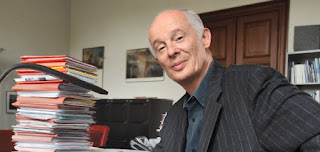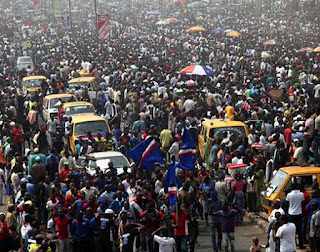The More the Merrier - A World Overflowing
Current leader, China, at 1.4 billion is expected to contract by almost half to 732 million, falling to third place. So, if China, now first becomes third, while India, now second becomes first, who gets second place by 2100?
That would be Nigeria that is expected to explode from today's 200 million to just shy of 800 million by the end of this century. Nigeria may be looking at second place overall but it could double India's population density.
In these scenarios, the global population, now closing in on 8 billion, will rise to about 10.3 billion before entering a population decline.
The US will go from third today to fourth while Pakistan holds on to 5th overall. Japan falls from 10th today at 128 million to 38th with a paltry 60 million.
Canada, thankfully, does not make the charts but, if we heed Mulroney's urging, we could be way bigger than Japan by 2100.
Much of Nigeria's predicted growth will be based on its petro-economy, especially crude oil and natural gas. That makes it a very reluctant player in the march to a low-carbon world. For all its fossil energy wealth, Nigeria has a domestic energy shortage and high rates of poverty. The CIA world factbook shows a poverty level of just over 40 per cent.
Are these projections reliable? I doubt it. We don't even know how hot the world will be by 2050, 2080 or 2100. Nigeria today averages 79 F in August, 85 F in March. Africa is already being hit by heatwaves and locusts. 200 million Nigerians also face a real food security problem.
Nigeria is facing a food security crisis that is compounded by the COVID-19 global pandemic and its effects on the food value chain in the country. The pandemic has significantly disrupted already fragile value chains across the country, including people's ability to produce, process, and distribute food.
"The German government's top climate scientist, Hans Joachim Schellnhuber, discussed his council's findings at a recent conference at New Mexico's Santa Fe Institute. AlterNet has an interesting report on the presentation by Mark Hertsgaard of The Nation:
"Schellnhuber and his WBGU colleagues go a giant step beyond the findings of the Intergovernmental Panel on Climate Change, the UN body whose scientific reports are constrained because the world's governments must approve their contents. The IPCC says that by 2020 rich industrial countries must cut emissions 25 to 40 percent (compared with 1990) if the world is to have a fair chance of avoiding catastrophic climate change. By contrast, the WBGU study says the United States must cut emissions 100 percent by 2020 -- in other words, quit carbon entirely within ten years. Germany and other industrial nations must do the same by 2025 to 2030. China only has until 2035, and the world as a whole must be carbon free by 2050. The study adds that big polluters can delay their day of reckoning by "buying" emissions rights from developing countries, a step the study estimates would extend some countries' deadlines by a decade or so."
Schellnhuber, then the outgoing chairman of the Potsdam Institute, put in an appearance at the Paris climate summit in 2015 where Trudeau strolled onto the convention floor to proclaim "Canada's back." He didn't pull any punches when asked if the 1.5 C consensus was doable:
“In the end it is a moral decision. Do you want to be part of the generation that screwed up the planet for the next 1,000 years? I don’t think we should make that decision.”
The Paris conference was attended by more than 2,000 scientists from 100 countries. Schellnhuber told the delegates: “In order to stay below 2C (36F) [the internationally agreed limit for global warming], or even 3C, we need to have something really disruptive, which I would call an induced implosion of the carbon economy over the next 20-30 years. Otherwise we have no chance of avoiding dangerous, perhaps disastrous, climate change.”



The fact that they're discussing 2 or 3 degrees is terrifying. We'll see many lives lost even if we could hold at 1.5. I know some people who see having a baby as the ultimate sign of hope, but I can't imagine bringing a child into this. It's not like at the start of war, when life went on because of course the war would end one day. This won't end; it will only get worse.
ReplyDeletePeople are still waiting for a magic wand, Marie. I had lunch with a law school buddy who morphed into an insanely affluent venture capitalist. We spoke of many things as most do when "catching up."
DeleteClimate change eventually popped up and my friend - witty, urbane, well-travelled (he actually keeps a Ferrari garaged in Switzerland for getting around the EU), wealthy and powerful said "they'll think of something."
He got a bit miffed when I told him that was religious thinking. So I asked him to tell me just who are "they" and what does he imagine they'll think of. I suggested he was blithely taking these things on faith which, given the stakes, was a weak way to deal with the future of his grandkids.
Two years ago I spoke with one of the scientists at the Global Footprint Network offices in San Fransisco. They conclude that humanity reached the Earth's ecological carrying capacity in the early 70s when we numbered in the low 3-billion range.
I asked her, given the growth in human population, consumption and pollution did they have an estimate of the planet's human carrying capacity today. She said they think it's somewhere around 2 billion. Not good news when we're now closing in on 8 billion.